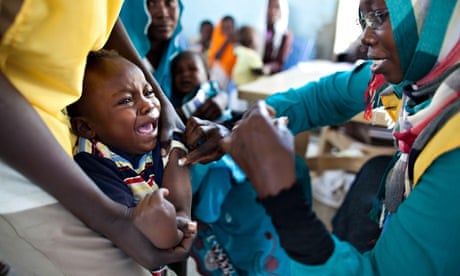Let's buck the doom and gloom of the nightly news bulletins for a minute and kick off with some cheer. According to the Gates Foundation, the world is – by almost any measure – better than ever.
This may sound counterintuitive when so many people are struggling at home, but extreme poverty around the world has halved since 1990, a record number of girls attend school, and diseases that once wiped out entire communities are in retreat.
All of this is partly thanks to the internationally agreed millennium development goals. Although they did not get everything right, the MDGs set clear and concise targets. From eradicating poverty and boosting education to tackling disease and mother-and-infant mortality, the goals helped focus minds and funding on core, achievable aims.
International representatives will gather in New York on Monday to finalise their proposals for global development for the next 15 years. Or, as the UN puts it, the 13th session of the open working group on sustainable development goals.
Of course, it is not quite as simple or as powerful as the Make Poverty History campaigns. No wonder the process is yet to capture the world's imagination. But make no mistake, this is a real opportunity to change our planet for the better.
With the correct goals, we can wipe out extreme poverty, secure health coverage at all ages and begin to reverse climate change. That is a thrilling prospect – which is why these negotiations need an urgent injection of radical ambition led by the UK.
However, the British government is not doing enough to push things forward. Negotiations on development are a very real example of how the isolation this country is falling into – which so delights the Tory back benches – is not just bad for Britain, but bad for all those who hope for an equitable world.
When Labour was in power, Tony Blair and Gordon Brown used hard-won political capital to convince and to cajole other rich states into playing their part. David Cameron and his government must get off the sidelines and do the same.
At the negotiations this week, there are three things this government should push for. First, the UK should lead calls to place the battle against climate change at the heart of any new agreement. It should push for a commitment to keep the global rise in temperature below 2C to become top priority, as well as retaining pledges on environmental sustainability.
The climate is the central development issue of the next century. If we fail to tackle the changes in our environment, all the gains we make elsewhere – from health and poverty to food and sanitation – will be reversed.
Second, the UK should use its status as the home of the NHS and a world leader in public health to demand a headline commitment on universal coverage.
As the party that founded the NHS, healthcare for all is central to Labour's beliefs. There is convincing evidence that universal health coverage leads to better outcomes, reduces inequality and helps prevent 100 million people a year from descending into poverty. That is why we want to see universal health coverage included at goal level.
On poverty, the UK should extend further than a simple plan to eliminate the risk of anyone having to survive on just $1.25 (73p) a day. It should raise the bar and call for an ambitious new target of $2. The new goals are scheduled to expire in 2030, but today, more than 1 billion people live on $1-2 a day. We cannot simply overlook that level of poverty for the next 15 years.
Of course, the next development targets must focus on more than climate change, poverty and universal healthcare, but we think that is a good place to focus our efforts. In addition, the goals must address inequalities in gender and education, resource scarcity, disease and hunger, sanitation, governance and the rule of law. And they must maintain respect for, and recognition of, human rights and much else besides.
The UK has a robust record on development. We have helped steer the world to groundbreaking agreements – the time has come for Britain to do so again. There is no time to lose – there are millions of lives to save.








Comments (…)
Sign in or create your Guardian account to join the discussion